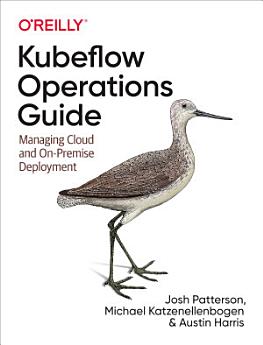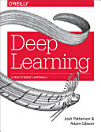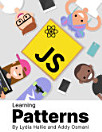Kubeflow Operations Guide
關於本電子書
Authors Josh Patterson, Michael Katzenellenbogen, and Austin Harris demonstrate how this open source platform orchestrates workflows by managing machine learning pipelines. You'll learn how to plan and execute a Kubeflow platform that can support workflows from on-premises to cloud providers including Google, Amazon, and Microsoft.
- Dive into Kubeflow architecture and learn best practices for using the platform
- Understand the process of planning your Kubeflow deployment
- Install Kubeflow on an existing on-premises Kubernetes cluster
- Deploy Kubeflow on Google Cloud Platform step-by-step from the command line
- Use the managed Amazon Elastic Kubernetes Service (EKS) to deploy Kubeflow on AWS
- Deploy and manage Kubeflow across a network of Azure cloud data centers around the world
- Use KFServing to develop and deploy machine learning models
關於作者
Josh Patterson is CEO of Patterson Consulting, a solution integrator at the intersection of big data and applied machine learning. In this role, he brings his unique perspective blending a decade of big data experience and wide-ranging deep learning experience to Fortune 500 projects. At the Tennessee Valley Authority (TVA), Josh drove the integration of Apache Hadoop for large-scale data storage and processing of smart grid phasor measurement unit (PMU) data. Post-TVA, Josh was a principal solutions architect for a young Hadoop startup named Cloudera (CLDR), as employee 34. After leaving Cloudera, Josh co-founded the Deeplearning4j project and co-wrote Deep Learning: A Practitioner's Approach (O'Reilly Media).
Michael Katzenellenbogen is an independent consultant with a deep and wide technological background and experience. He had the good fortune of getting involved with technology at a young age, and has been witness to the birth of the Internet and its various transformations and stages. Having grown up with and alongside the Internet has allowed him to become adept in cutting edge technologies. Michael has a deep background in data management, software architecture, and leveraging new and emerging technologies in creative and novel ways. His roles included managing data for The New York Times, leveraging big data platforms, such as Hadoop, early on, as well as in the role of Principal Solutions Architect at Cloudera, helping F100 enterprises architect and implement very large data and compute clusters. Michael's current focus is in helping enterprises lower the barrier to entry for Machine Learning, leveraging technologies such as Kubernetes and Kubeflow.
Austin Harris is a Distributed Systems Engineer based in Chattanooga, Tennessee. Austin is a specialist in Apache Kafka and distributed systems architecture. He has applied his knowledge via consulting with companies to architect data pipelines in order to handle and analyze big data in real-time. He has worked in fields including smart city infrastructure, wearable technologies, and signal processing. Austin received a master’s degree in Computer Science from the University of Tennessee at Chattanooga. While attending the University of Tennessee Austin published research on machine learning activity recognition techniques, HIPAA compliant architectures, and real-time dynamic routing algorithms.





